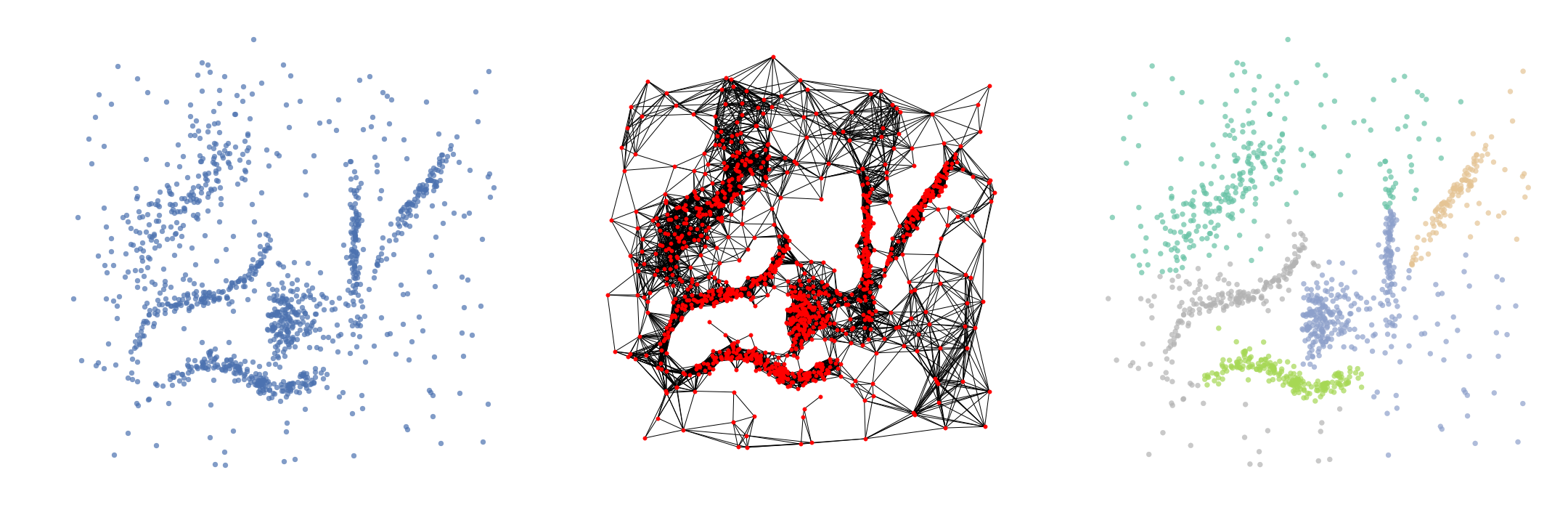A self-contained, scikit-learn API-oriented Python package supporting a variety of different clustering algorithms for Machine Learning applications.
Developed as part of "Mathematical aspects in Machine Learning", Freie Universität Berlin, summer semester 2017.
This package provides the following functionality:
Distance-based clustering:
- Regular space clustering
- K-Means/K-Means++ (Lloyd-type iterative method)
Density-based clustering:
- DBSCAN
- Mean shift
Similarity/graph-based clustering:
- Spectral clustering (Normalized cuts method/standardized graph Laplacian)
- Affinity Propagation
- Hierarchical clustering
Note: Spectral clustering and Affinity propagation offer options to cluster on abstract graphs and adjacency/similarity arrays.
Fuzzy methods:
- Fuzzy C-Means
Consensus clustering (similarity-based):
- By reclustering points
- By reclustering clusters and competing for points
from clustertools.models.density import MeanShift
from clustertools.load_data import load_spiral_data
data = load_spiral_data(scale=True)
ms_instance = MeanShift(data,**params)
ms_instance.fit()numpy, scipy, matplotlib
Call
python setup.py install
from project directory. Alternatively, call
pip install git+https://github.com/clustertoolsgroup/clustertools_project
to install from github.
Arthur, David and Sergei Vassilvitskii. "How Slow is the K-means Method?". Proceedings of the Twenty-second Annual Symposium on Computational Geometry. SCG '06. New York, NY, USA: ACM: 144–153 (2006).
Arthur, D. and Vassilvitskii, S. "k-means++: the advantages of careful seeding." Proceedings of the eighteenth annual ACM-SIAM symposium on Discrete algorithms. Society for Industrial and Applied Mathematics Philadelphia, PA, USA. pp. 1027–1035 (2007).
Bezdek, James C., Robert Ehrlich, and William Full. "FCM: The fuzzy c-means clustering algorithm." Computers & Geosciences 10.2-3 (1984): 191-203
Comaniciu, Dorin, and Peter Meer. "Mean shift: A robust approach toward feature space analysis." IEEE Transactions on pattern analysis and machine intelligence 24.5 (2002): 603-619.
Dhillon, Inderjit S. and Guan, Yuqiang and Kulis, Brian. "Kernel K-means: Spectral Clustering and Normalized Cuts." Proceedings of the Tenth ACM SIGKDD International Conference on Knowledge Discovery and Data Mining (2004): 551--556
Ester, Martin and Hans-Peter Kriegel and Jörg Sander and Xiaowei Xu. "A density-based algorithm for discovering clusters in large spatial databases with noise." Proceedings of the Second International Conference on Knowledge Discovery and Data Mining (1996): 226--231
Fränti, Pasi. "Clustering datasets." Clustering datasets. N.p., 2015. Web. 07 July 2017. http://cs.uef.fi/sipu/datasets/.
Frey, Brendan J. and Delbert Dueck. "Clustering by Passing Messages Between Data Points." Science Vol. 315, Issue 5814 (2007): 972-976
Hastie, Trevor, Robert Tibshirani, and Jerome Friedman. "Hierarchical clustering." The elements of statistical learning 2 (2009).
Jordan, Michael I., Andrew Y. Ng and Yair Weiss: "On spectral clustering: Analysis and an algorithm." In: Advances in Neural Information Processing Systems. 2, (2002), S. 849-856.
Lloyd, S. P. "Least square quantization in PCM". Bell Telephone Laboratories Paper. Published later: Lloyd., S. P. (1982). "Least squares quantization in PCM." IEEE Transactions on Information Theory. 28 (1957): 129–137.
MacQueen, J. B. "Some Methods for classification and Analysis of Multivariate Observations." Proceedings of 5th Berkeley Symposium on Mathematical Statistics and Probability. 1. University of California Press (1967): 281–297.
Malik, Jitendra and Jianbo Shi. "Normalized Cuts and Image Segmentation. IEEE Transactions on Pattern Analysis and Machine Intelligence." 22(8), (2000), S. 888-905.
Ostrovsky, R., Rabani, Y., Schulman, L. J. and Swamy, C. "The Effectiveness of Lloyd-Type Methods for the k-Means Problem". Proceedings of the 47th Annual IEEE Symposium on Foundations of Computer Science (FOCS'06). IEEE. (2006) pp. 165–174.
Perez-Hernandez, Guillermo, Fabian Paul, Toni Giorgino, Gianni de Fabritiis and Frank Noé. "Identification of slow molecular order parameters for Markov model construction" Journal of Chemical Physics, 139(1) (2013): 015102.
Prinz, J.-H., H. Wu, M. Sarich, B. Keller, M. Senne, M. Held, J. D. Chodera, C. Schütte and F. Noé: "Markov models of molecular kinetics: Generation and Validation." J. Chem. Phys. 134, 174105 (2011).
Strehl, Alexander, and Joydeep Ghosh. "Cluster ensembles---a knowledge reuse framework for combining multiple partitions." Journal of machine learning research 3.Dec (2002): 583-617.
Turlach, Berwin A. "Bandwidth selection in kernel density estimation: A review." Louvain-la-Neuve: Université catholique de Louvain, 1993.
